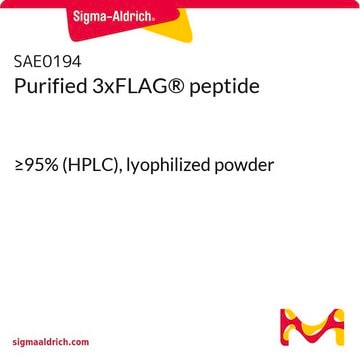FLAGIPT1
FLAG® Immunoprecipitation Kit
Synonim(y):
Anti-ddddk, Anti-dykddddk
Zaloguj sięWyświetlanie cen organizacyjnych i kontraktowych
About This Item
Kod UNSPSC:
12352200
NACRES:
NA.32
Polecane produkty
zastosowanie
kit sufficient for 50 reactions
Poziom jakości
klasy chemiczne analitów
proteins (FLAG® Affinity Gels)
metody
immunoprecipitation (IP): suitable
Warunki transportu
wet ice
temp. przechowywania
−20°C
Opis ogólny
Sigma′s FLAG Immunoprecipitation kit allows a rapid and efficient immunoprecipitation and elution of an active FLAG-tagged protein. The immunoprecipitation is performed with the ANTI-FLAG M2 affinity gel, which is a highly specific monoclonal antibody covalently attached to agarose resin. The use of affinity resin allows an efficient binding of FLAG-tagged proteins without the need for preliminary steps and calibrations. The immunoprecipitated FLAG-tagged proteins can be efficiently eluted from the resin with acidic conditions or by competition with FLAG peptide. The immunoprecipitated proteins can be detected for their size, post-translational modifications, and interactions on gel electrophoresis, and by activity assays.
Zastosowanie
Learn more product details in our FLAG® application portal.
Cechy i korzyści
- Utilizes highly specific ANTI-FLAG M2 affinity gel
- No preliminary steps or calibrations
- 3X FLAG™ peptide provides efficient and gentle elution through direct competition
Inne uwagi
All prodedures to be performed at 2-8°C.
Informacje prawne
3xFLAG is a trademark of Sigma-Aldrich Co. LLC
FLAG is a registered trademark of Merck KGaA, Darmstadt, Germany
This page may contain text that has been machine translated.
produkt powiązany
Numer produktu
Opis
Cennik
Hasło ostrzegawcze
Warning
Zwroty wskazujące rodzaj zagrożenia
Zwroty wskazujące środki ostrożności
Klasyfikacja zagrożeń
Aquatic Chronic 3 - Eye Irrit. 2
Kod klasy składowania
10 - Combustible liquids
Certyfikaty analizy (CoA)
Poszukaj Certyfikaty analizy (CoA), wpisując numer partii/serii produktów. Numery serii i partii można znaleźć na etykiecie produktu po słowach „seria” lub „partia”.
Masz już ten produkt?
Dokumenty związane z niedawno zakupionymi produktami zostały zamieszczone w Bibliotece dokumentów.
Klienci oglądali również te produkty
Mercedes Rodriguez-Teja et al.
Molecular cancer research : MCR, 13(3), 538-547 (2014-11-09)
Epithelial cell-cell contacts maintain normal glandular tissue homeostasis, and their breakage can trigger epithelial-to-mesenchymal transition (EMT), a fundamental step in the development of metastatic cancer. Despite the ability of C-type lectin domains (CTLD) to modulate cell-cell adhesion, it is not
Konstantinos Koudounas et al.
Plant physiology, 174(3), 1371-1383 (2017-05-10)
Oleuropein, a terpene-derived glycosylated secoiridoid biosynthesized exclusively by members of the Oleaceae family, is involved in a two-component defense system comprising a β-glucosidase that activates oleuropein into a toxic glutaraldehyde-like structure. Oleuropein and its deglycosylated derivatives have high pharmaceutical interest.
Kuancan Liu et al.
Molecular therapy : the journal of the American Society of Gene Therapy, 28(3), 901-913 (2020-01-29)
Esophageal squamous cell carcinoma (ESCC) is a predominant cancer type in developing countries such as China, where ESCC accounts for approximately 90% of esophageal malignancies. Lacking effective and targeted therapy contributes to the poor 5-year survival rate. Recent studies showed
Samer Swedan et al.
Journal of virology, 85(19), 10090-10100 (2011-07-29)
Human respiratory syncytial virus (RSV), a major cause of severe respiratory diseases, efficiently suppresses cellular innate immunity, represented by type I interferon (IFN), using its two unique nonstructural proteins, NS1 and NS2. In a search for their mechanism, NS1 was
Andrew S Terker et al.
American journal of physiology. Renal physiology, 315(4), F781-F790 (2018-02-08)
With no lysine kinase 4 (WNK4) is essential to activate the thiazide-sensitive NaCl cotransporter (NCC) along the distal convoluted tubule, an effect central to the phenotype of familial hyperkalemic hypertension. Although effects on potassium and sodium channels along the connecting
Nasz zespół naukowców ma doświadczenie we wszystkich obszarach badań, w tym w naukach przyrodniczych, materiałoznawstwie, syntezie chemicznej, chromatografii, analityce i wielu innych dziedzinach.
Skontaktuj się z zespołem ds. pomocy technicznej













